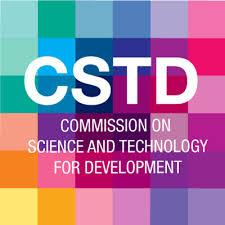Panel discussion on applying a gender lens to science, technology, and innovation
13 May 2019 15:00h - 16:00h
Event report
[Read more session reports and live updates from the 22nd Session of the Commission on Science and Technology for Development]
The session was moderated by Mr Wang Ruijun (Vice-Chair of the CSTD) who said that the discussion would focus on the progress made in the Implementation of the Outcomes of the World Summit on the Information Society (WSIS) and their impact on gender equality. He mentioned the importance of having talks on national science, technology, and innovation policy reviews.
Ms Dame Jocelyn Bell Burnell (Astrophysicist, Oxford University, 2018 Laureate of the Special Breakthrough Prize in Fundamental Physics) started by explaining her education path in science and technology in the UK. She talked about her passion for technology since an early age, and how growing up in the 60s and 70s there was no gender equality. She also noted experiencing ‘Imposter Syndrome’ during that time and said that she worked very hard in order to overcome the obstacles.
Moreover, Bell Burnell highlighted how her career was like ‘snakes and ladders’ and stressed that she had more work to do in astronomy. She said that according to the data of the International Astronomical Union (IAU), only 17% of the members were women and talked about the possible contributing cultural factors. According to her, the companies that have the most diverse (gender and/or ethnicity) Executive Board are doing great in business. Finally, she mentioned the creation of the Athena SWAN Award, which recognises women-friendliness in Ireland, Australia, Canada, and the USA.
Ms Shirley M. Malcom (Director of Education and Human Resources Programs of the American Association for the Advancement of Science (AAAS)) talked about the experience of women in the science and technology sector. She noted that science, technology and innovation (STI) are the pillars of economic development. Malcom stressed that STI research must be inclusive for women. Furthermore, she pointed out the necessity of human resources and UN leadership based on gender equality. She said that the number of women in technology and astronomy is still quite low, and she talked about the challenges faced by women in implementing the sustainable development goals (SDGs). Finally, she said that we must look at gender as the key pillar of economic development and noted that we have to address the challenges faced by women in STI.
Ms Neth Dano (Co-Executive Director, ETC Group) explained the personal and social perspectives of gender issues. She noted the inequality reflected in the number of women in STI, and that since 1901 there have only been 17 female recipients of the Nobel Prize in physics and chemistry. In addition, she talked about the technology leadership of women as one of the tools to improve gender equality. Dano mentioned that there must be political will and efforts in promoting the participation of women in science and technology. In conclusion, she noted that many professional sectors such as surgery, firefighting, and astrophysics should work to improve gender equality and diversity within.
Mr Mher Margaryan (Permanent Representative of Armenia, Chair of the Commission on the Status of Women (CSW)) explained how the work of the CSW is contributing in the field of STI. He said that gender equality is necessary to achieve positive and effective economic development. In addition, he emphasised the actions that can facilitate the application of STI: collecting data on women in science and technology, gender analysis based on the improvement of women in economic development, etc.
Ms Nkandu Luo (Minister of Higher Education, Zambia) explained that Zambia has decided to make policy reforms in STI in high-schools and universities. She highlighted that the cultural tendencies are a huge challenge in Zambia when it comes to accessing education, especially in STI.
During the interventions of the members states, the representative of Austria talked about the actions taken by the Austrian government in order to tackle gender equality and the need for women to take an active part in leadership positions at universities and institutions on a national level. She also highlighted the support of women in technology and development co-operation.
The representative of Angola talked about the role of women in the field of STI. She highlighted the ‘Angola Initiative’ initiated in February 2019 which supports young women in STI studies. Finally, she noted that Angola encourages women in technology leadership on a national level.
By Gilles D. Bana
Related topics
Related event

22nd Session of the Commission on Science and Technology for Development
13 May 2019 16:30h - 17 May 2019 16:30h
Geneva, Switzerland
